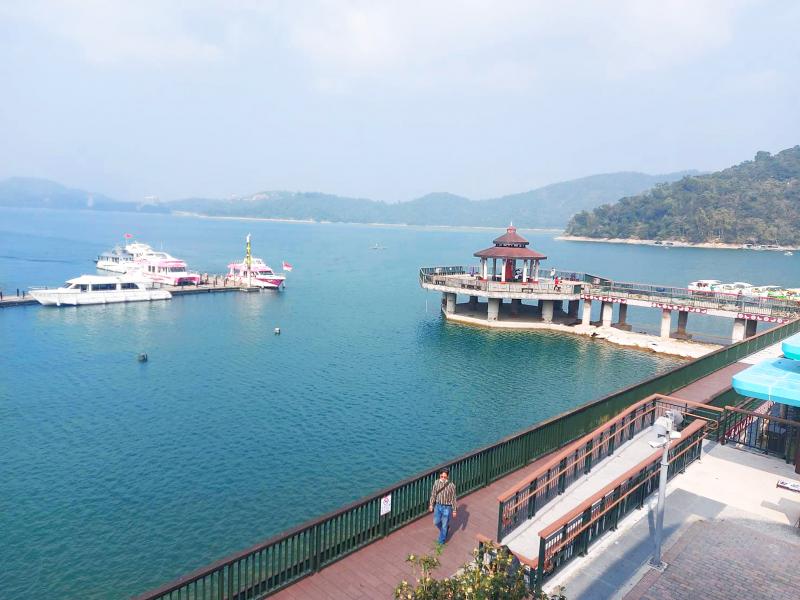The Ministry of Economic Affairs has deployed 159 emergency wells and created an emergency desalinization plant to tackle a difficult water shortage the nation is facing, Deputy Minister of Economic Affairs Tseng Wen-sheng (曾文生) said yesterday.
The two resources would together contribute more than half a million tonnes of water to the nation’s daily supply, Tseng said after a meeting at the Central Emergency Operation Center focusing on the water situation in the nation.
By early next month, the emergency wells would be contributing 336,000 tonnes of water daily and the emergency desalinization plant in Hsinchu County would be contributing 200,000 tonnes, he said.

Photo: Taipei Times
Hsinchu, Miaoli and Changhua counties as well as Taichung have been placed on “orange alert” for a water shortage, while Tainan and Taoyuan as well as Chiayi County are on “yellow alert,” the ministry said.
Areas on yellow alert have their water pressure reduced and the public is encouraged to conserve water, while an orange alert entails limiting total water use as well as reducing the water pressure.
The government has also declared major irrigation stoppages in some areas and asked industrial water users to reduce consumption by 7 percent.
The emergency wells were dug years in advance, Water Resource Agency Deputy Director-General Wang Yi-feng (王藝峰) said by telephone.
However, construction on a network of pipes to connect the wells to the nation’s water system began only in August last year, Wang said.
“Back then, we did not know the drought was coming,” Wang said. “But we sped up the construction when we realized a drought was coming for sure, around late October.”
An additional 1,250 emergency wells have yet to be deployed nationwide, the agency said.
With the Lunar New Year around the corner, Tseng asked people to limit their water use during the traditional house cleaning in preparation for the new year.
“If everybody cleaned [their homes] all at once, it would affect the water pressure, so consider cleaning during off-peak times,” he said, suggesting people to “wipe more and wash less.”
Although agricultural use accounts for 70 percent of water use in Taiwan, “it is everybody’s responsibility to conserve water,” Wang said.
“Farmers have seen irrigation stoppages and industry is conserving as well. Now that we are tapping into more expensive water sources such as desalinization, it is paramount to treat water as a precious resource,” he said.

TECH BOOST: New TSMC wafer fabs in Arizona are to dramatically improve US advanced chip production, a report by market research firm TrendForce said With Taiwan Semiconductor Manufacturing Co (TSMC, 台積電) pouring large funds into Arizona, the US is expected to see an improvement in its status to become the second-largest maker of advanced semiconductors in 2027, Taipei-based market researcher TrendForce Corp (集邦科技) said in a report last week. TrendForce estimates the US would account for a 21 percent share in the global advanced integrated circuit (IC) production market by 2027, sharply up from the current 9 percent, as TSMC is investing US$65 billion to build three wafer fabs in Arizona, the report said. TrendForce defined the advanced chipmaking processes as the 7-nanometer process or more

China’s Huawei Technologies Co (華為) plans to start mass-producing its most advanced artificial intelligence (AI) chip in the first quarter of next year, even as it struggles to make enough chips due to US restrictions, two people familiar with the matter said. The telecoms conglomerate has sent samples of the Ascend 910C — its newest chip, meant to rival those made by US chipmaker Nvidia Corp — to some technology firms and started taking orders, the sources told Reuters. The 910C is being made by top Chinese contract chipmaker Semiconductor Manufacturing International Corp (SMIC, 中芯) on its N+2 process, but a lack

NVIDIA PLATFORM: Hon Hai’s Mexican facility is to begin production early next year and a Taiwan site is to enter production next month, Nvidia wrote on its blog Hon Hai Precision Industry Co (鴻海精密), the world’s biggest electronics manufacturer, yesterday said it is expanding production capacity of artificial intelligence (AI) servers based on Nvidia Corp’s Blackwell chips in Taiwan, the US and Mexico to cope with rising demand. Hon Hai’s new AI-enabled factories are to use Nvidia’s Omnivores platform to create 3D digital twins to plan and simulate automated production lines at a factory in Hsinchu, the company said in a statement. Nvidia’s Omnivores platform is for developing industrial AI simulation applications and helps bring facilities online faster. Hon Hai’s Mexican facility is to begin production early next year and the

Who would not want a social media audience that grows without new content? During the three years she paused production of her short do-it-yourself (DIY) farmer’s lifestyle videos, Chinese vlogger Li Ziqi (李子柒), 34, has seen her YouTube subscribers increase to 20.2 million from about 14 million. While YouTube is banned in China, her fan base there — although not the size of YouTube’s MrBeast, who has 330 million subscribers — is close to 100 million across the country’s social media platforms Douyin (抖音), Sina Weibo (新浪微博) and Xiaohongshu (小紅書). When Li finally released new videos last week — ending what has